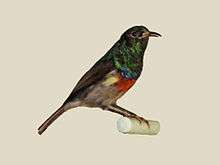Eastern double-collared sunbird
| Eastern double-collared sunbird | |
|---|---|
.jpg) | |
| Scientific classification | |
| Kingdom: | Animalia |
| Phylum: | Chordata |
| Class: | Aves |
| Order: | Passeriformes |
| Family: | Nectariniidae |
| Genus: | Cinnyris |
| Species: | C. mediocris |
| Binomial name | |
| Cinnyris mediocris (Shelley, 1885) | |
| Synonyms | |
| |
The eastern double-collared sunbird (Cinnyris mediocris) is a species of bird in the Nectariniidae family. It is found in upland areas of the Democratic Republic of the Congo, Kenya, Malawi, Mozambique, Tanzania, and Zambia.
Description

The eastern double-collared sunbird is a small species. The adult male has upper parts a metallic green, dark wings and tail, and a red breast band and olive belly. The beak is strongly curved and used to sip nectar from flowers. The adult female is olive above, with brown on the wings and yellowish-green underparts.[2]
Distribution and habitat
The eastern double-collared sunbird is native to mountainous regions of East Africa. Its range includes Kenya, Tanzania, Zambia, Malawi ad Mozambique. It is found in forests, upland pasture, heathland and bamboo, at altitudes of between 600 and 1,500 m (2,000 and 4,900 ft). It descends to lower altitudes after the breeding season.[2]
Ecology
The eastern double-collared sunbird feeds alone or in pairs, or may join small flocks of mixed species, which are often led by the white-headed wood hoopoe (Phoeniculus bollei). It feeds on nectar, insects, spiders and small molluscs; the insects include flies, neuropterans and hymenopterans. Flying ants may be caught on the wing, prey invertebrates are picked off the backs of leaves, and inflorescences are explored acrobatically to extract nectar.[2]
Status
The eastern double-collared sunbird is a common species within its range. The population trend is thought to be steady, no particular threats have been identified and the International Union for Conservation of Nature has assessed its conservation status as "least concern".[1]
References
- 1 2 BirdLife International (2012). "Nectarinia mediocris". IUCN Red List of Threatened Species. Version 2016.2. International Union for Conservation of Nature. Retrieved 20 October 2016.
- 1 2 3 Mann, Clive F.; Cheke, Robert A. (2010). Sunbirds: A Guide to the Sunbirds, Flowerpeckers, Spiderhunters and Sugarbirds of the World. Bloomsbury Publishing. pp. 278–279. ISBN 978-1-4081-3568-6.

